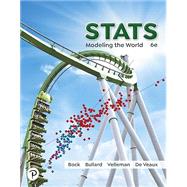Stats: Modeling the World will get you thinking statistically from the start. It leads with practical data analysis and graphics to help you think in a statistical context. Updated, relevant examples and data plus the authors' signature "Think, Show, and Tell" problem-solving method teach you to approach a question, solve the problem and communicate meaning. The 6th Edition updates and adds examples, exercises and data throughout, with access to the data where possible. Many examples and exercises are based on recent news stories, articles, and other sources, with many listed so you can explore them further.









